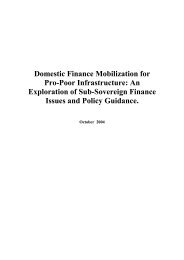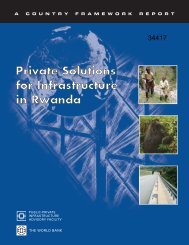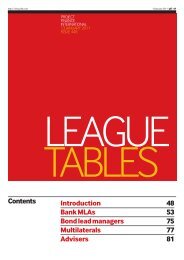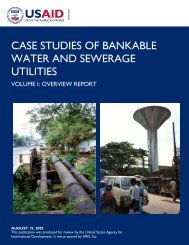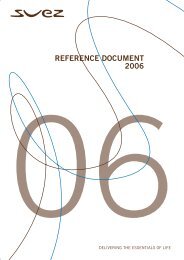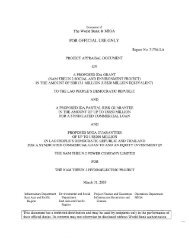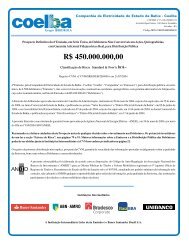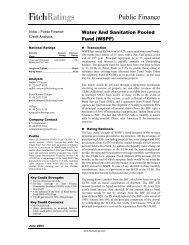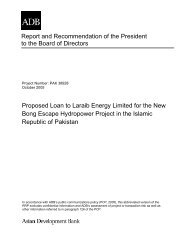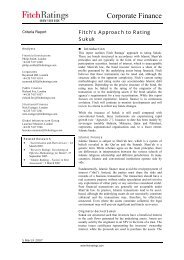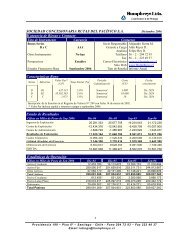EAP - The Pacific Infrastructure Challenge - World Bank (2006).pdf
EAP - The Pacific Infrastructure Challenge - World Bank (2006).pdf
EAP - The Pacific Infrastructure Challenge - World Bank (2006).pdf
You also want an ePaper? Increase the reach of your titles
YUMPU automatically turns print PDFs into web optimized ePapers that Google loves.
Box 7.7: Private Sector Involvement in Telecommunications<br />
A number of <strong>Pacific</strong> countries have involved the private sector in providing<br />
telecommunications services. In most cases, a private sector company has<br />
partnered with the government (e.g. Fiji’s FINTEL or Telecom Vanuatu Limited),<br />
or with other private investors (e.g. Solomon Telekom Company (ST)) to provide<br />
telecommunications services.<br />
<strong>The</strong>se companies have traditionally been granted an exclusive, long term operating<br />
license, which can be reviewed at certain intervals. <strong>The</strong>se monopoly arrangements<br />
have inhibited growth in the telecommunications sector. <strong>The</strong> Solomon Islands<br />
experience provides an example of how this occurs.<br />
<strong>The</strong> Government of Solomon Islands (GoSI) entered into a telecommunications<br />
license with Solomon Telekom Company (ST). ST is a joint venture of the<br />
Solomon Islands National Provident Fund (51%), Cable & Wireless (41.9%) and<br />
the Investment Corporation of the Solomon Islands (7.1%). <strong>The</strong> License grants ST<br />
exclusive operating rights for all telecommunications services. <strong>The</strong> License<br />
provides for a review of the terms on a five yearly basis.<br />
This arrangement has failed to produce good performance:<br />
Total teledensity levels are among the lowest in the region<br />
Services are limited to the main city - approximately 90% of the market is in<br />
Honiara<br />
International and mobile calling costs, and internet access prices are among the<br />
highest in the region.<br />
One of the principle reasons for this poor performance is a lack of accountability.<br />
Some of the key issues are:<br />
<strong>The</strong> exclusive long term License does not allow for competition or<br />
interconnection<br />
<strong>The</strong> License does not stipulate any investment obligation for the operator. It<br />
mentions a community service obligation, but does not set specific coverage<br />
targets. <strong>The</strong>re is therefore little incentive to extend service<br />
<strong>The</strong> government lacks detailed technical knowledge and understanding of the<br />
sector and is therefore unable to regulate the operator effectively.<br />
GoSI has initiated a telecommunications sector reforms as part of a comprehensive<br />
economic reform program, in which it aims to address these issues. Renegotiating<br />
the License when it comes up for review in 2008 is a priority, and will include and<br />
evaluating options for revising the exclusive nature of this agreement.<br />
Source: <strong>World</strong> <strong>Bank</strong>, Castalia research and interviews<br />
Key features of successful public sector involvement include:<br />
Selecting a PSP contract that matches the sector specific problems. For<br />
example, if a key issue is management skills and capability, then a<br />
management contract may be a good solution. If a utility lacks both<br />
adequate management skills and requires significant investment to turn<br />
performance around, then a concession contract may be a better option<br />
Careful contract design to ensure that:<br />
– Responsibilities are clearly allocated<br />
– Operator incentives will drive expected performance<br />
– <strong>The</strong> contract takes account of the specific social and political context in<br />
the country<br />
– <strong>The</strong>re are clear provisions for dispute resolution<br />
Ensuring there are appropriate oversight mechanisms in place.<br />
53



